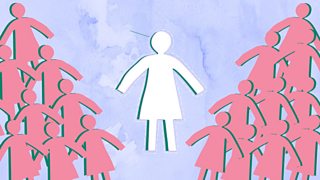How to make death better (for those dying and the loved ones left behind)
Death tolls are sadly being reported every day at the moment, but it’s still hard for many of us to think about death and dying.
Woman’s Hour dedicated an entire programme to the topic, speaking to listeners and palliative care experts about dying. Here, Dr Catherine Millington-Sanders, Dr Rachel Clarke, Fi Munro, who has been diagnosed with cancer and Annabel, a Woman’s Hour listener who’s mother has dementia, give their best advice on why we should be thinking more about death and how to make it a bit less scary.

Allow those difficult conversations to happen
“Talking about death and dying and planning is very important,” says Dr Catherine Millington-Sanders, clinical lead for palliative and end of life care for the Royal College of GPs and Marie Curie. “In general practice, we aim to support people and help them prevent getting unwell. If they do, hopefully we can cure them and relieve their symptoms. But, for some people if they were to get so sick and were to potentially be sick enough to die, it’s about having conversations early, to say what you would like and potentially what you would not like.
Have those difficult conversations early and give people the opportunity to think through what they do want.Dr Catherine Millington-Sanders
“The important thing is about having those difficult conversations early and giving people the opportunity to think through what they do want, where they may want to be cared for if they were to get so sick that they might actually be facing dying.
“Just being able to open up these discussions and the taboo that has previously sat behind it, it’s a really good opportunity whilst we’re all reflecting what we want in terms of treatment, to be able to start thinking about some of those plans, whether it ever comes to fruition within Covid-19 or not.”
Make sure your wishes are known
“I’ve got a really open dialogue with my oncologist, a really good relationship with my husband and my family around death and dying and I’m very open about my plans,” says Fi Munro, who is 34 and was diagnosed with stage four ovarian cancer four years ago. “I’ve done powers of attorney with my husband. I’ve done my will and I’ve also got my funeral plans. So everything is laid out and I’m very confident that everyone knows my wishes.
“Now we find ourselves in this situation with Covid-19, I think so many people are being forced to look at their own mortality and I think it is changing the discussions around life and death. Actually for all of us, including people that are healthy, it can be so beneficial to have these open conversations and anticipatory planning.”
“I think everybody should have an advanced plan,” says Annabel, a Woman’s Hour listener who’s mother has dementia and who has helped plan her mother’s end of life care. "It’s also critically important in my opinion from the perspective of the NHS. It’s in the DNA of the NHS to try to save a person’s life at almost any cost. So to help the doctors, emergency services or care home staff make some difficult decisions, I think it’s vital that the patient’s wishes are recorded and are available to those people.”

If you don鈥檛 know where to start, speak to your GP
“Everybody is an individual. We should be having conversations with each individual and those important others,” says Dr Catherine Millington-Sanders. “What I would say is I think these are incredibly difficult conversations for families, so if anybody actually finds themselves in those situations, I would be just requesting them to have a chat with their GP.
"You can actually talk through those difficult conversations and concerns that people have about putting plans in place. Just having a bit of time and being able to do that with someone that knows how to do it in a planned way can be extremely helpful.”
Support the loved ones you leave behind
“I think advanced plans should be a will and everybody should have one,” says Annabel. “It’s really important, not just for the person whose plan it is, but also for their loved ones.”
“In the year before I was diagnosed, we lost both of my grandparents and we had an experience there where we didn’t have power of attorneys in place and wills in place,” adds Fi Munro. “Having experienced how that can affect a family, I think that has allowed more open discussions about the importance of having all of that planning in place. It makes things easier at a difficult time - as easy as they can be in a sense. You know their wishes and that everything is in place so that the family can support that person. You can really help the family in that sense.”
“It’s ok to talk about this,” adds Dr Rachel Clarke, a palliative care doctor. “It probably won’t distress your family as much as you might fear and actually to calmly and reflectively have a conversation in advance before the worst happens can avoid so much unnecessary distress and panic and hardship later down the line.”

Prepare for death so you can focus on life
“I have taken the view from day one that we’re actually all terminal and what my diagnosis gave me was just this wake up call to realising how precious life is,” says Fi Munro.
We鈥檙e actually all terminal and what my diagnosis gave me was just this wake up call to realising how precious life is.Fi Munro
“On just a normal evening with my husband, we were visiting friends elsewhere in Scotland and as we were driving home we witnessed an attempted suicide. We witnessed someone running towards a car and it was a wake up call for me because I was lying with the person who had obviously chosen to take their life and myself as someone who is living with a terminal condition. It just really made me realise how precious life is and how fragile it is and how we all walk this fine line between life and death.
“Actually none of us are immortal, so in many ways I see it as a gift for opening my eyes to that and helping me to see how important it is to plan our deaths. We need to be really open about it so that we can live our lives day to day while we still have the privilege of doing so.”
There is more information and support about this topic in the links below:
(Recommended Summary Plan for Emergency Care and Treatment)
You can listen to all episodes of Woman’s Hour via 91热爆 Sounds. You can also follow Woman’s Hour on and .




